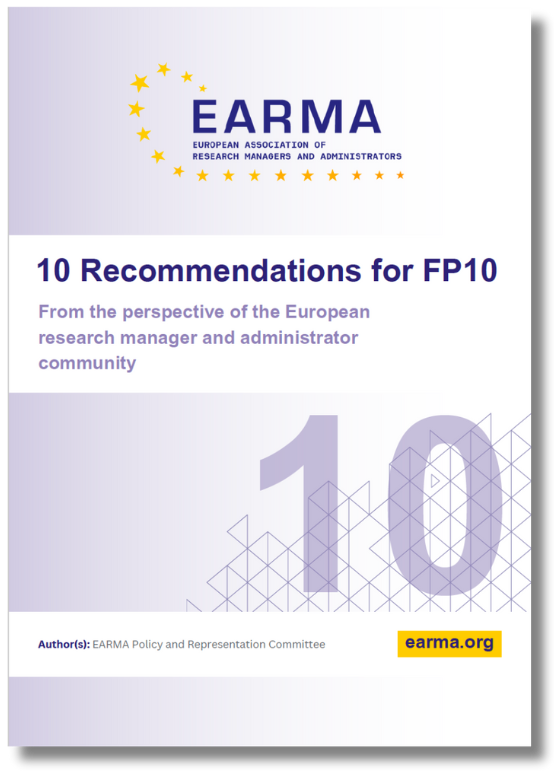The European Association of Research Managers and Administrators (EARMA) has formulated its position on the next European Union (EU) Framework Programme (currently designated FP10).
The position paper, titled 10 Recommendations for FP10, outlines the priorities of the community of European research managers and administrators (RMAs) and calls for dedicated funding streams to enhance research management (RM), streamline bureaucracy in the next Framework Programme and highlights the need to further develop synergies with other EU and national funding programmes as well as providing FP10 with an ambitious and ring-fenced budget.
This document was produced by the EARMA Policy and Representation Committee (PRC), led by Eleonora Zuolo (PRC Chair), and included the widest consultation of our membership that our association has conducted in relation to policy formulation. EARMA would like to thank the community members that contributed to 10 Recommendations for FP10 for sharing their knowledge.
The next Framework Programme
In recent years, we have seen a commitment by the European Commission (EC) to support the professionalisation and recognition of the RM profession through ERA 2022-2024 Action 17 (Enhance the strategic capacity of Europe’s public research performing organisations). FP10 presents many opportunities to further support research managers’ development.
Reducing bureaucracy to enable excellence and impact remains vital in FP10. It is important that RMAs, as key stakeholders, are involved in the implementation. EARMA’s community represents the researcher and innovator's voice and is very familiar with the pain points and opportunities for further simplification.
EARMA is recommending that the EC and the FP10 Expert Group provide an ambitious yet realistic costing of the proposed budget for FP10. EARMA considers the amount of at least €200 billion, as supported by much of the European R&I community, a good starting point.
The European Commission has an opportunity in FP10 to tackle some of the transversal issues that are becoming increasingly more relevant. A greater effort must be made to ensure a better balance between fundamental research and innovation as well as creating a more inclusive environment to enable the full participation of social sciences, arts, and humanities (SSH) disciplines. The association is also putting forward a number of suggestions that could address some of the remaining challenges in mainstreaming Open Science.
EARMA is seeking a more reflective approach towards equality, diversity, and inclusion (EDI) requirements whilst broadening the scope to include belonging. Preparation to address anticipated increased ethics and integrity concerns will be necessary in FP10 in addition to continuing to strengthen global approaches to excellent R&I cooperation
Our community looks forward to engaging further with our stakeholders and policymakers in the implementation of our recommendations, aiming to unlock the full potential of European R&I through strategic investment in research management.
Recommendations
1. FP10 must have an ambitious and ring-fenced budget.
2. Empower the RMA profession through dedicated funding streams and budget lines in accordance with the ERA policy agenda.
3. Ensure a better balance between fundamental and innovation driven research funding.
4. Address the remaining challenges in mainstreaming Open Science.
5. Provide a more inclusive environment to enable the full participation of social sciences, arts, and humanities (SSH) disciplines.
6. Prepare to fully address anticipated increased ethics and integrity concerns.
7. Fully accessible and streamlined with reduced research bureaucracy.
8. Critically reflect on gender equality plans and move towards broader equality, diversity, and inclusion (EDI).
9. Continue to strengthen global approaches to excellent R&I cooperation.
10. Further develop synergies with other EU and national funding programmes.

View the full position paper.

